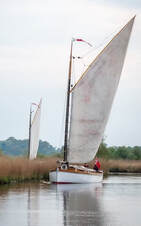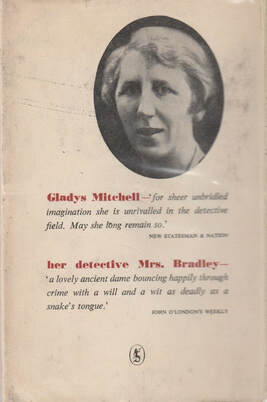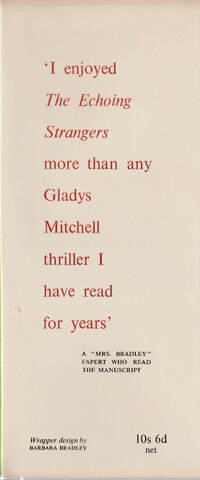THE ENIGMATIC TWINS
Tracy K: In this section, Mrs. Bradley and Inspector Gavin follow up on more of their theories related to the murders of Mr. Campbell (in Wetwode) and Mr. Witt (in Mede). Sometimes they interview the people involved together, sometimes they go their separate ways and come back to discuss what they have found. There continue to be surprises in this section, although much that is learned here just confirmed earlier suppositions.
Joyka: Since blackmail is the obvious motive for both victims, it appears that the twins must be involved and perhaps are even the murderers. But could they have murdered Campbell and fastened his body to that boat? Didn’t Mrs. Bradley prove they could not have done that murder? And why would Witt be blackmailing the twins?
Elle: With regard to the twins, why would one sound the alarm about Campbell being dead?? With one twin having an alibi with Miss Higgs – presumably Francis – that leaves Derek, but he can't swim thus being unable to tie Campbell up....then.....but...maybe it was Derek in Francis' place while on holiday with Miss Higgs; Francis then "stayed away from the river" after Campbell's death, which was later opined because he couldn't swim.

José: Miss Higgs confesses that, after their first encounter, the two boys met every year at the summer holiday time. On the initiative of Derek, she doesn't even know how he managed to do it, for a week every year Derek has been with us at whatever seaside place I choose for Francis. Mrs Bradley has no doubt of one thing: Campbell was killed because he new too much. Knew that there were two boys and that they changed places. Could the same apply to Witt?
Joyka: Poor Mrs Higgs, just dim enough not to realize the danger she has unwittingly unleashed in this family.
Theda: The link between Campbell and Witt becomes clear, but were they really killed for blackmailing? Or were they killed because the murderer did not want knowledge of the twins’ deception to derail their ultimate plan (and escape from justice). And did Witt really know about the deception? I can only assume that either Campbell told him, or that Witt’s demise was due to him having information on Campbell’s murder.
Elle: Why would a blackmailer be killed over what seems to be misdemeanors, if that?! Having the police around due to the murders seems like biting off the nose to spite the face.
INTERVIEWS AND “ACCIDENT”
Chris: In regular consultation with Gavin, Mrs Bradley now gets to interview Miss Higgs; Malachi Thetford; the fishermen Tavis and Grandall; Mabel Parkinson; the Cornishes (one of whom conveniently drops dead on the spot); Darnwell and his latest chorus-girl Sadie; the village boy who knows Malachi and his nephew; and finally Sir Adrian himself.
Tracy K: Again I am interested in the relationships that Mrs Bradley has with others. When she first came to Wetwode, she was not eager to meet up with [acquaintance] Mabel at all, but since then Mabel has proved to be resourceful and helpful in parts of the investigation. Inspector Gavin was quite impressed. "Gavin found himself rather in love with Mrs Bradley’s old school chum. She might be a tedious old duck, but of her good-nature and loyalty there could be no doubt at all."
José: Mrs Bradley can't get anything clear with the servants at Mede and decides to address Cornish once again. 'We want to know who, besides yourself, had a motive for wanting Mr Witt out of the way', said Mrs Bradley. 'We know you didn't kill Witt', she said. 'Who did?'
'I reckon it was young Caux,' Cornish answered. 'But ask me why ... I don't know, It's just as it seemed to work out.'
Shortly after, Cornish collapses and falls dead, and the only thing that Mrs Bradley manages to find out, thanks to Mrs Cornish, is that there was some sort of connection between Campbell and Witt.
Elle: Was Cornish murdered? and was he murdered by yet another criminal??!
Tracy K: Mrs Bradley decides to talk to Mr. Darnwell again. Darnwell rents one of the bungalows along the river year-round and was interviewed after Mr Campbell's body was discovered. He was the first person to point out to Mrs Bradley that Campbell was a snoop and a blackmailer. She describes Darnwell to Inspector Gavin thusly: "The entertainer of nieces. The joy and the scandal of Wetwode. The expert on Easter Island art. The most interesting man I've met since I first met you."
Chris: The interviews are interesting, not so much of Tavis, a cardboard Stage Welshman, but certainly of Darnwell. Mrs Bradley’s admiration for Darnwell becomes evident, as it emerges that he has self-confidently rebuffed Campbell’s attempts to blackmail him. Being a self-confessed sinner helps him both to understand and to defeat Campbell’s methods, so Mrs Bradley appreciates Darnwell as what was then called a ‘man of the world’, commending him for having ‘the virtuous vice of tolerance’ (Chapter 16). Compared with Campbell or with the wife-beater Cornish he appears almost saintly.
Joyka: [And then we have] Sir Adrian Caux — GM makes him out to be a pretty repulsive character, even hinting that he was responsible for the death of his own son and his wife so that he, Sir Adrian, could raise the one remaining twin on his own! And he did not care which twin survived! It takes the preeminent psychiatrist, Mrs. Bradley, to figure that out.
José: After her conversation with Sir Adrian, Mrs Bradley doesn't make anything clear and she is left asking herself: 'Well, I wish we could see through the trees, then. Motive, motive, motive! That's what's holding everything up.'

Tracy K: I enjoyed seeing Miss Higgs and Mabel Parkinson again in this section but I missed Tom Donagh who had featured so prominently in the first half of the book.
DANGLING THREADS AND CONFOUNDING QUOTATIONS
José: Thanks to Darnwell's information, Mrs Bradley manages to tie up loose ends, although I must admit that part of Mrs Bradley's reasoning escapes me. In any case she believes that Sir Adrian life is in real danger and rushes to warn him.
Theda: “I’ve lost the thread,” said Sir Adrian uncertainly. “You were saying?”
I think this quote best describes my feeling about the many conversations Mrs Bradley has (with Cornish, Gavin, Sir Adrian and others) in which she speaks so obliquely that I’m not sure that either I, or the character, truly understands what she is saying. But, strangely enough, there is always a kernel of information that I can grab and move on with.
Tracy K: In the light of Inspector Gavin's position with Scotland Yard, it is amusing that Mrs B often addresses him as "child." Of course he is younger than she is, but still they must know each other quite well and have worked together a good bit in the past. At some point we are told that he is her secretary's fiancé.
Elle: [The introductory quotation for Book Two:] ‘But if you talked to yourself, you did not answer yourself. I am certain I heard two voices.’ Oliver Goldsmith, She Stoops to Conquer. This quote makes no sense to me. Since “You did not answer yourself, I am certain I heard two voices”: would there not be only one voice instead of two?? Or is this a reference to the twins??
Joyka: It is interesting that Gladys Mitchell uses the word Echo in the names of all of the remaining chapters. The sins of the past are definitely echoing throughout this book. But who are the Echoing Strangers? Does this refer to the twins, their grandfather, the victims, who?

Theda: Some loose ends have been tied up, but more have unraveled, and the various pieces of information that lead to, or support, or contradict the many theories have multiplied in these chapters. Looking forward to them being woven together.
Check in next week to see how Gladys Mitchell manages to weave together this book’s plot, character, and theme and learn whether the reading group finds the resulting tapestry rich and vibrant, cluttered and wanting, of something in between!






 RSS Feed
RSS Feed